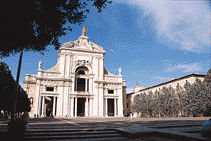The Portiuncula Indulgence:
Legend, Tradition and Rubrics
By Carol Ann Morrow
 The Basilica of St. Mary of the Angels, built where the first friars gathered around Francis, now surrounds the chapel. Photo by Jack Wintz, O.F.M.
The Basilica of St. Mary of the Angels, built where the first friars gathered around Francis, now surrounds the chapel. Photo by Jack Wintz, O.F.M.
ST. FRANCIS SAID, “HOLY father, if it please your Holiness, my wish is that, because of the great things which God has done in this place, all those who shall come here with lowly and contrite hearts shall have remission of all their sins, and that there shall be no dispute about this.” And the pope said, “I grant you that it shall be so.”
This is the testimony of the Lord James, priest of Santa Lucia di Colle, given on August 14, 1277, and included in the fourth revised edition of St. Francis of Assisi: Writings and Early Biographies, often called the Omnibus. It’s good to have, since nowhere in Francis’ own writings or in the early biographies by Thomas of Celano and St. Bonaventure, or even in the whimsical Fioretti, is the Portiuncula Indulgence mentioned.
And it is an incredible story. Prior to this indulgence with its simple requirements, the only such indulgence was offered for participation in a Crusade! And it was known only by word of mouth until 1921, according to Franciscan scholar Murray Bodo, O.F.M.
And now the privilege extends beyond the Portiuncula to churches throughout the world. The indulgence—a remission of the temporal punishment for sin if all the conditions are fulfilled—may be gained by the faithful from noon August 1 to midnight August 2 through a devout visit to a parish church, a cathedral or some other oratory (such as a chapel of the Franciscans). An Our Father, the Creed and another prayer of one’s choice are to be prayed. Reception of the sacraments of Penance and Eucharist, as well as prayer for the intention of the Holy Father, are to happen within several days of the visit (see Enchiridion of Indulgences, especially #65).
In Tales of St. Francis: Ancient Tales for Contemporary Living (St. Anthony Messenger Press, 1992), Father Bodo writes, “Though present Church practice does not emphasize the granting of indulgences, especially those attached to a particular place rather than to the practice of virtue, thousands of pilgrims still flock to Assisi on the day of the Portiuncula Pardon, some crawling on their knees through the large basilica to the Portiuncula chapel, which rests under the central dome.”
Francis would have been pleased that all who come with lowly and contrite hearts are finding pardon.

0 Comments